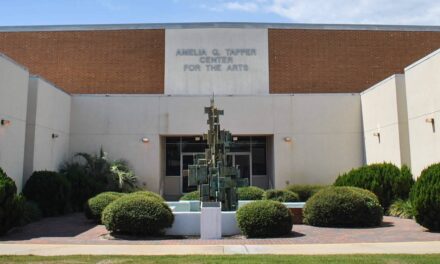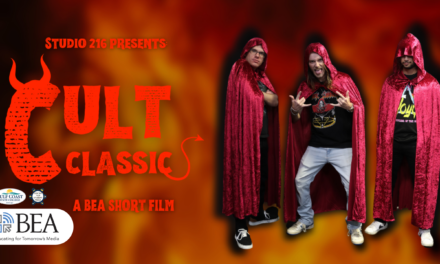Photo Credits: Timothy Dykes
When it comes to TTRPGs (Table Top Role Playing Games), the players and Game Master (as called Dungeon Master) work together to make collaborative story. Even if you have the rules of the game and its parts needed to play there may be more things that people want to add even if it’s not already in the game or it’s rules. This sort of unofficial content is usually considered homebrew, but what is homebrew? In this article two members of the TTRPG Club are interviewed to learn more about homebrew, it’s uses, and its value.
Seth Locey
To begin Seth explained what homebrew was in TTRPGs as he stated they were unofficial additions to a TTRPG. When asked if he used homebrew, he stated he occasionally does for enhancement, balance, assistance purposes. Additionally, he stated that as a player he tends to avoid homebrew due to problems when it comes to balancing as they can have less testing or quality checks compared to their official counterparts. When asked how they would balance homebrew, they explained that it depends on what it provides different to what the game officially provides, but it generally should have benefits, drawbacks, and a variety of neutral tones to prevent consolidation of power to a specific player. When asking what to do when homebrew isn’t balanced, they had stated it is usually addressed early on in the game during or before the first session, so in the case if adjustments need to be made, they are able to be made with minimal difficulty. Seth also added that trying to catch the possible problems with the homebrew early works better than later because it can lead to backlash as people have become more attached to mechanic and its interactions. When asking about homebrew that was balanced well, they explained how a player was a living suit of armor for a game which meshed well with the game and had their own way to interact with the story. He additionally explained that good balanced homebrew is sometimes difficult to recognize an unofficial when compared. When asking how it was well balanced, they stated because it was interesting, it wasn’t overpowering, and because it didn’t take away from the story. When asking about homebrew which had gotten out of control, they mentioned a game were the player had gained aerial superiority with could decimate non-flying enemies in that the Game Master had to change up the encounters for their players. When asked what could have fixed the problem with the homebrew, they stated that the problem wasn’t the homebrew rather the situation they found themselves in which caused the item to be exploitable. When asked if there was any homebrew they maintain use of, they stated that it depends from system to system, but they general don’t as to not change too much around as they don’t want to break something within the system. When asking when does homebrew become too much, they stated when it becomes the main focus, unfairly tries to make a single player the main character, or takes away from the story or the game. When asked if homebrew is more lenient when it comes to length of a game, they state that neither necessarily relate to each other due to how flexible and diverse homebrew can be. When asking about how homebrew differs from officially released 3rd party content, they stated that it varies because the 3rd party content is technically homebrew with more backing and presumably more quality check, but it the result being variable for what you look for as they further compare it to thrifting. When further asking if 3rd party content could have the same problems as homebrew, they state that it usually doesn’t as they usually have to resources to mitigate those problems. Seth also added that the 3rd party content is given more critical observation due to their more professional and paid nature compared to how homebrew is casually. When asked why would people heavily modified a TTRPG rather than to play a different TTRPG that doesn’t need the modifications, they stated that the biggest factor is accessibility as most entry level games and the means to modify them are usually more accessible than specific games that would function more in line as you’d like them to play or function as is. When asked what games are usual the main targets of homebrewed, they stated that the main targets are more entry level games and games with greater intellectual property because people may favor the ease and functionality of a system or to apply personal creative application to the intellectual property. Seth had also stated that more niche games don’t get homebrewed as often because they usually line up to what they already were looking for. When asking if the ability to homebrew and modify these games factor into how well people may return to or enjoy a TTRPG, they said they could imagine it because of much people are able to do with the preexisting space in the TTRPG or because how could pivot to your story as they make a LEGO analogy saying “You can build whatever you want, but the stuff on the box is always gonna be there.” When asking how would they would deal with a player wanting to use homebrew in their story, they stated as long as the player isn’t trying to be the main character above the rest of the party, it doesn’t matter. When asked to state their opinions on homebrew, they stated it was a wonderful tool for both Game Masters and players to build interesting stories and characters.
Benjamin Grey Gadston
The begin Ben explained what homebrew was in TTRPGs, stating it as creating new content in a TTRPG that doesn’t mechanically exist in the game with varying levels quality. When asked if they use homebrew, they state that they’ve recently be experimenting with homebrew by making creatures that would increase the quality of their campaign. When asked how they would balance homebrew, they explained that they would aim for achievable and low power rather than going into high power. When asking what to do when homebrew isn’t balanced, they had stated it try would try to work around it because they haven’t had that experience yet. When asking about homebrew that was balanced well, they talked about the Conductor and their Ghost Train as it was a narrative multitool, a fun adventure for early game, and a later game threat. When asking how it was well balanced, they stated it was because the mystery around the creature and the type of threat it posed. When asking about homebrew which had gotten out of control, they mentioned they hadn’t really had a bad experience yet, but did provide an encounter they had to greatly scale down because many of the players were not present to fight it. When asked if there was any homebrew they maintain use of, they stated that they use rules from a TTRPG called Pathfinder for quality-of-life changes. When asking when does homebrew become too much, they stated when it becomes dumb and godlike. When asked if homebrew is more lenient when it comes to length of a game, they say the doesn’t have the Game Master experience to a be certain, but they stated longer games would be less lenient on the homebrew because some homebrew can shut down the story which would not be helpful in a longer story. When asking about how homebrew differs from officially released 3rd party content, they state with their limited experience with 3rd party content that regular homebrew is more free than the official 3rd party content as he says that the homebrew feels more open outside of a book. When further asking if 3rd party content could have the same problems as homebrew, they state that it can sometimes with certain times or creature where thing go overboard or “stupid”. When asked why would people heavily modified a TTRPG rather than to play a different TTRPG that doesn’t need the modifications, they referred to Dungeons and Dragons as an example which is “flawed” then referred to a TTRPG called Pathfinder as a better game then states that you could improve Dungeons and Dragons with parts of Pathfinder (possibly referring to himself as the people in question). When asking if the ability to homebrew and modify these games factor into how well people may return to or enjoy a TTRPG, they stated that it does as the homebrewing aspect can overwhelm people. When asking how would they would deal with a player wanting to use homebrew in their story, they stated they said they would allow it and also give the option for other players if they showed interest. When asked to state their opinions on homebrew, they stated it has added a lot to games like Dungeons and Dragons and allows more creative opportunities than the creators of the games provided.
Maddie Pierce
Student Writer - Spring 2025










